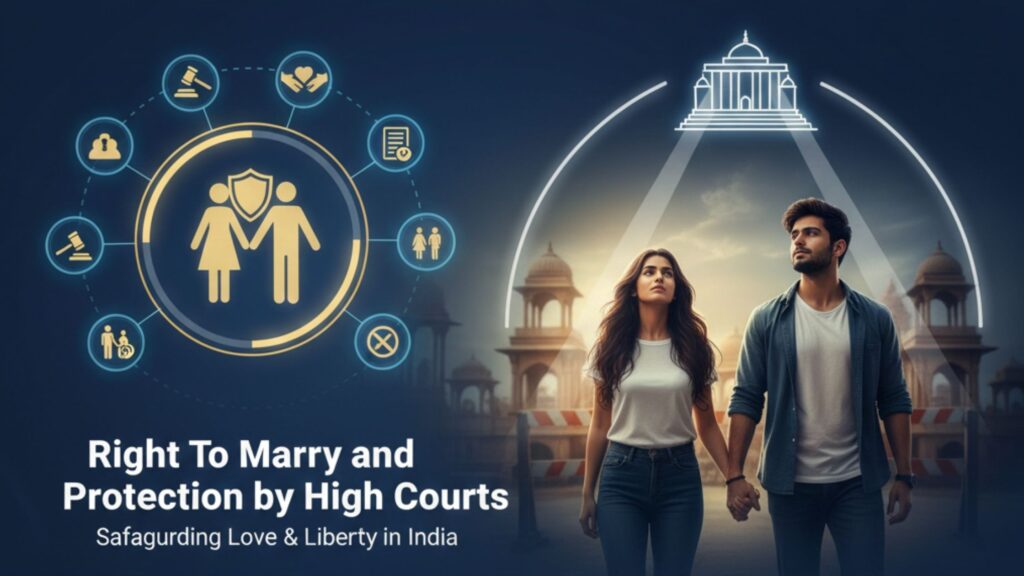Court Marriage- Without Consent of Parents
Court marriage- without consent of parents– Marriages in India are seen as a sacred bond that holds immense sentimental value. The role of families is significant in marriage; it is regarded as a shared decision. However, the law defines it as the independent right of the partners. Court marriages have emerged as a popular choice for couples who wish to tie the knot legally, irrespective of religious, or community differences. It not only provides a straightforward process but also offers legal protection and recognition of the relationship.
An important aspect of Court Marriage is that it can be legally conducted with the consent of both parties, without requiring approval from their parents. The couples may face disapproval by their families, influenced by cultural and customary differences. Under such circumstances, court marriage serves as a vital option, giving them the right to marry by choice if they are of legal age.
This process allows adults to solemnize their union before a marriage officer and obtain a marriage certificate. The certificate acts as evidence of the performed marriage. There’s a common misconception that court marriage in India requires parental permission. Here’s a thorough and well-explained overview of Court Marriage- Without Consent of Parents , brought to you by Advocate Amit Gupta.

Legal Age Requirement for Court Marriage
If you’re of legal age and entering the marriage willingly, you have the legal right to marry via court marriage without involving your parents.
The minimum age requirements are:
- Male: 21 years
- Female: 18 years
The legal age for court marriage is determined by the Special Marriage Act, 1954, which applies to all Indian citizens regardless of religion
Is Parental Consent Required for Court Marriage in India?
The answer is “NO”. In India, the law offers the legal right to both men and women to perform a court marriage as long as both partners are legally eligible. It not only reflects the legal approval but also a powerful assertion of individual freedom in India. Court Marriage in India is legally allowed under various specific laws, such as: Special Marriage Act, 1954, Hindu Marriage Act, 1955, and Judicial precedent.
According to the Special Marriage Act, 1954, any two individuals, irrespective of religion, caste, or creed can marry in a court if :
- The bride must be at least 18 years old, and the husband must be at least 21 years old
- Neither party has a living spouse at the time of marriage.
- The parties must be of sound mind.
- They must be able to provide legitimate consent at the time of marriage.
- Both parties should be free of any mental illness or insanity.
- The relationship should not fall under the prohibited degrees of relationship.
Thus, the law empowers couples to marry of free will. It ensures that their constitutional right to marry a partner of their choice is upheld.
Understanding the Rights of Couples Under Court Marriage Without Family Approval
Court marriage offers couples a legal pathway to unite without requiring the consent of their parents. These right ensures that both partners can navigate property ownership, inheritance, and other legal matters with clarity. Here’s a list of rights granted to couples under Court Marriage Without Family Approval.
- Right to Choose a Life Partner: Article 19 of the Indian Constitution allows us to marry anybody we want a person of one’s choice.
- Validity Across India: Court marriages are valid across India. This document is proof of marriage for all legal, social, and official purposes.
- Police Protection: In cases where couples fear threats, violence, or harassment from family members, they can seek protection from the police.
- Interfaith and Inter-caste Marriages: It serves as one of the easiest ways to perform ways for interfaith or inter-caste couples to marry, avoiding social and religious complications.
- Right to Inheritance: Couples are entitled to inherit property from each other as per succession laws
How to Proceed Court Marriage in India, Without Parents’ Consent?
Here’s a step-by-step guide of legally performing a court marriage in India without parental consent. It involves a list of steps, that has been mentioned as follows:
- Ensuring the Legal age: To perform a legal court marriage without consent of parents in India, parties need to be of appropriate age (Male 21 years nd Female 18 years) and need witnesses, not necessarily parents.
- Notice of Intended Marriage- File a notice of intended marriage at the Marriage Registrar’s office of the district where at least one of the parties has been residing for at least 30 days.
- Required Documents: A list of required documents has been mentioned as follows:
- Proof of age
- Proof of residence (Aadhar card, voter ID,etc.)
- Passport-sized photographs
- ID proof of both parties (Aadhar, PAN, Passport)
- Affidavit stating marital status and eligibility
4. Publication of Notice: The notice is published by the marriage registrar for objections to the marriage for 30 days. Anyone can raise objection, within the period of 30days.
5. Marriage solemnization: if there are no valid objections, the couple can proceed to marry at the registrar’s office. Presence of Both parties, along with three witnesses is required. They will sign the declaration of marriage.
6. Registration of Marriage: Once the declaration is signed, the Marriage Registrar issues a Marriage Certificate which serves as a legal proof of marriage.
Conclusion
For couples who wish to marry on their own terms, court marriage offers a legitimate, lawful, and dignified path. The law supports and provides legal acceptance to the marriage without parent’s approval. However, navigating the legal procedures can often be cumbersome process, especially for couples facing opposition. Advocate Amit Gupta a highly professional lawyer, in family and matrimonial matters, makes the court marriage process smooth, safe, and legally secure.






